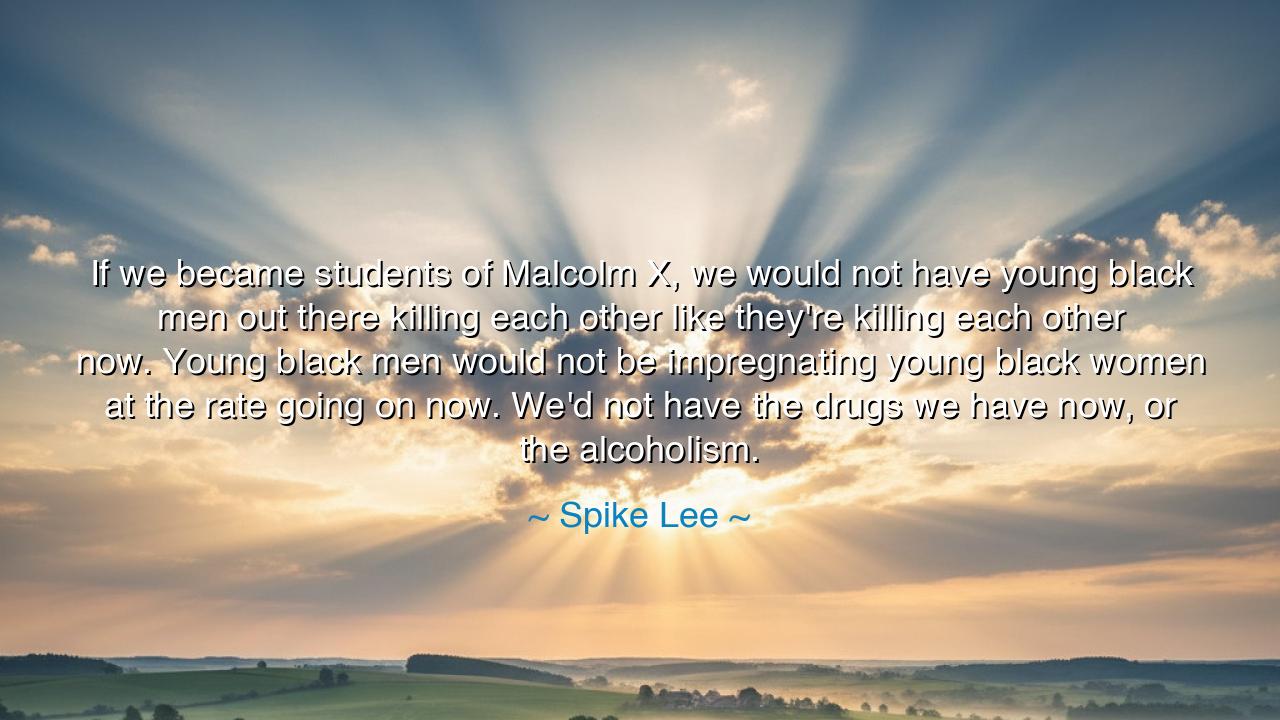
If we became students of Malcolm X, we would not have young
If we became students of Malcolm X, we would not have young black men out there killing each other like they're killing each other now. Young black men would not be impregnating young black women at the rate going on now. We'd not have the drugs we have now, or the alcoholism.






Hear the words of Spike Lee, spoken like a trumpet call to a people wandering in storm: “If we became students of Malcolm X, we would not have young black men out there killing each other like they're killing each other now. Young black men would not be impregnating young black women at the rate going on now. We'd not have the drugs we have now, or the alcoholism.” These words are not light—they are heavy with sorrow, heavy with urgency, heavy with hope. They are a plea to remember, a cry to awaken, a command to study not just a man, but a movement of the soul.
For the origin of this cry lies in the life of Malcolm X, who rose from ashes darker than most men can imagine. Born into poverty, his father murdered, his mother broken, Malcolm fell into the traps of crime, lust, and prison. But there, behind the iron bars, he was reborn. He became a student of discipline, of dignity, of faith, and of self-respect. He emerged not a criminal, but a warrior of the spirit, demanding that Black men see themselves not as victims but as kings, not as shadows but as sons of the Most High.
Spike Lee, in invoking Malcolm, speaks to the wound that festers in many communities—violence turned inward, lives wasted in drugs and despair, women dishonored, children born into chaos without fathers. He sees that these ills are not merely accidents, but the fruits of forgetting. For when a people forget the wisdom of their prophets, they stumble into darkness. To become students of Malcolm X means to remember discipline, to reclaim self-worth, to restore the sacred bond between men and women, and to fight the poisons—whether bullets, needles, or bottles—that destroy the spirit from within.
Consider the story of Malcolm after his pilgrimage to Mecca. Once he had spoken only of division, but after seeing Muslims of every race praying side by side, he declared that brotherhood was possible, that unity was the truest path. He returned with a broader vision, not weaker but stronger, because it was now rooted in love as well as pride. This transformation shows us that he was not only a firebrand, but a man who could grow, who could see beyond rage into reconciliation. To study him is to study the power of transformation itself.
Yet the tragedy is this: Malcolm was slain before his vision could fully take root. Like Moses who glimpsed but did not enter the Promised Land, his words were left for future generations to water. Spike Lee reminds us that the harvest of Malcolm’s teachings is not yet gathered. Too many still walk in forgetfulness, and so the chains remain—not of iron, but of violence, broken families, and self-destruction.
But O seeker, despair not. For every prophet’s voice, though silenced by death, still echoes in eternity. Malcolm’s lessons remain, waiting for students who will listen. The call is not for scholars in ivory towers, but for young men and women in the streets, in schools, in prisons, in homes—to learn dignity, discipline, and unity. If they take his words into their hearts, they will rise from being wanderers to being builders, from being broken to being whole.
The lesson, then, is clear: we must become students of Malcolm X in our own lives. What does this mean? It means honoring women as partners, not possessions. It means rejecting the poisons of drugs and drink, standing firm in clarity of mind. It means building brotherhood instead of bloodshed, choosing peace over self-destruction. And above all, it means discipline—the strength to rise before the sun, to work with purpose, to speak with truth, to walk with dignity even in the face of hatred.
So I say to you: do not let Malcolm’s words gather dust in books or be confined to history’s shelves. Let them burn within you as fire, guide you as a lamp, and strengthen you as armor. For if the youth take him as teacher, the streets will no longer echo with gunfire but with laughter, no longer drown in despair but shine with hope. The people will rise, and no chain—whether forged by others or by their own hands—shall bind them again.






AAdministratorAdministrator
Welcome, honored guests. Please leave a comment, we will respond soon